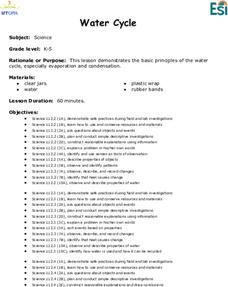Curated OER
Understanding the Water Cycle
Investigate the water cycle and how water moves from the land to the air and back to the land. Create a terrarium and observe the water cycle at work. Define weather terms including evaporation, condensation, and precipitation.
Curated OER
Water and Ice
Students perform experiments in pairs to visualize the changes in water during freezing and melting. In this properties of water lesson, students use their senses and inquiry tools to understand the changes in state of water. Suggested...
Curated OER
Water Cycle
Students perform experiments with water to observe the principles of evaporation and condensation. They make models of the water cycle and discuss the processes that occurred in their experiments with their jars of water.
Curated OER
Water and Ice
Students examine water. For this chemistry lesson, student examine the physical properties of water and how it changes from a liquid to a solid or a gas. This lesson contains links to a second and third complimentary lesson on...
Curated OER
Water and Ice
Students explore the states of water. In this water states lesson, students observe ice over time and the changes that take place. Students read a related text and draw their observations in a journal entry. Students discuss the...
Curated OER
Three Clouds Activity
Students understand how clouds are formed. In this cloud lesson, students participate in three experiments to make clouds. Students complete activity sheets for each experiment.
Curated OER
Three Clouds Activity
Students explore how clouds are produced through three different age-appropriate hands-on experiments.
Science Fun for Everyone
Science Fun: Olympic Medals
Create your own Olympic medal out of clay with the help of an adult. Watch as your design hardens over time as the water in the clay evaporates.
BBC
Bb Ci Schools: Revisewise Science: Solids, Liquids, Gases
This site contains an interactive activity in which students can learn about the three states of matter. There is also a factsheet that lists numerous properties of liquids, solids, and gases. The factsheet also uses water as an example...










